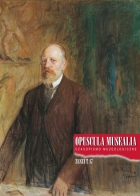Rola muzeów uniwersyteckich w dokumentacji badań naukowych
The role of university museums in documenting contemporary research
Author(s): Steven de ClercqSubject(s): Cultural Essay, Political Essay, Societal Essay
Published by: Wydawnictwo Uniwersytetu Jagiellońskiego
Keywords: university museum; UMAC; documenting research
Summary/Abstract: Ever since Vesalius’ and Bacon’s methods for research, enquiry and teaching were introduced into academic learning, university museums emerged for the purposes of caring and preserving specimens, objects, instruments and apparatuses. Specimens and objects that served as primary sources of information; instruments for observation and apparatuses for experimentation. As we would say today, the ‘core business’ of these university museums was to act as custodians of collections for academic research and teaching. Travels of discovery and exploration brought in numerous hitherto unknown objects, specimens and plants from remote areas all over the globe, leading to huge collections and museums, botanical gardens, chemical laboratories, anatomical theatres and astronomical observatories. This role, fully embedded within the very heart of the department, has changed dramatically, particularly during the second half of the twentieth century. As they ceased to play their once pivotal role and gradually became ‘obsolete’, collections were abandoned or even de-accessed and the number of university museums dropped signifi cantly. Meanwhile, a new type of university museum emerged, usually linked to the central university administration. These university museums primarily focussed on centralised care of abandoned collections. Although documenting the history of research and teaching was an important factor in their collection policy, the question whether they should have a role and responsibility in documenting contemporary research received little or no attention. This question remained largely unaddressed both at the institutional level and also in the wider context of the workshops and conferences organised by organisations like UMAC, Universeum and their fellow regional and national organisations. It was therefore appropriate that this topic was fi nally raised at the Universeum-workshop in Krakow 16–18 October 2008.
Journal: Opuscula Musealia
- Issue Year: 2010
- Issue No: 17
- Page Range: 13-21
- Page Count: 9
- Language: English

